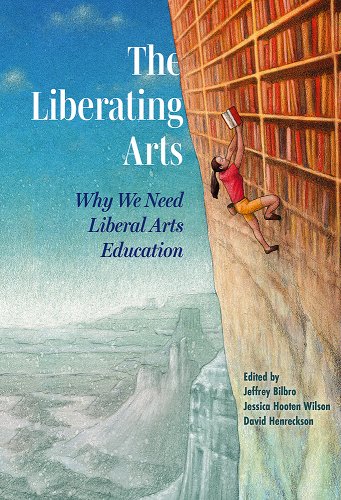Things have been quiet on our website in recent months, but we have been doing lots of work behind the scenes. This fall, Plough Books will be publishing The Liberating Arts: Why We Need Liberal Arts Education. After conducting many public conversations about the enduring value of a liberal arts education, we distilled ten questions that kept coming up when students, parents, teachers, administrators, and employers talk about this educational vision. We then set about answering these questions with chapters that include both essayistic argument and concrete examples of institutions and experiences that show what a liberating education looks like and the benefits it can offer.
We’ll be hosting several events to talk about these ideas in conjunction with the book’s publication. Let us know if your school or institution might be interested in partnering with us on one. On June 14th, we’re putting on a workshop at the Society for Classical Learning’s conference in Dallas. We’ll announce more dates and locations soon. For now, here’s the description of the book–please help us spread the word about this project. We hope that it will prove an inspiration and help to many who are seeking to foster the liberal arts in a cultural and economic season that seems quite challenging, but one which may in fact be ripe for just this vision of human formation and flourishing.
A new generation of teachers envisions a liberal arts education that is good for everyone.
Why would anyone study the liberal arts? It’s no secret that the liberal arts have fallen out of favor and are struggling to prove their relevance. The cost of college pushes students to majors and degrees with more obvious career outcomes.
A new cohort of educators isn’t taking this lying down. They realize they need to reimagine and rearticulate what a liberal arts education is for, and what it might look like in today’s world. In this book, they make an honest reckoning with the history and current state of the liberal arts.
You may have heard – or asked – some of these questions yourself:
- Aren’t the liberal arts a waste of time? How will reading old books and discussing abstract ideas help us feed the hungry, liberate the oppressed and reverse climate change? Actually, we first need to understand what we mean by truth, the good life, and justice.
- Aren’t the liberal arts racist? The “great books” are mostly by privileged dead white males. Despite these objections, for centuries the liberal arts have been a resource for those working for a better world. Here’s how we can benefit from ancient voices while expanding the conversation.
- Aren’t the liberal arts liberal? Aren’t humanities professors mostly progressive ideologues who indoctrinate students? In fact, the liberal arts are an age-old tradition of moral formation, teaching people to think for themselves and learn from other perspectives.
- Aren’t the liberal arts elitist? Hasn’t humanities education too often excluded poor people and minorities? While that has sometime been the case, these educators map out well-proven ways to include people of all social and educational backgrounds.
- Aren’t the liberal arts a bad career investment? I really just want to get a well-paying job and not end up as an overeducated barista. The numbers – and the people hiring – tell a different story.
In this book, educators mount a vigorous defense of the humanist tradition, but also chart a path forward, building on their tradition’s strengths and addressing its failures. In each chapter, dispatches from innovators describe concrete ways this is being put into practice, showing that the liberal arts are not only viable today, but vital to our future.
Contributors include Emily Auerbach, Nathan Beacom, Jeffrey Bilbro, Joseph Clair, Margarita Mooney Clayton, Lydia Dugdale, Brad East, Don Eben, Becky L. Eggimann, Rachel Griffis, David Henreckson, Zena Hitz, David Hsu, L. Gregory Jones, Brandon McCoy, Peter Mommsen, Angel Adams Parham, Steve Prince, John Mark Reynolds, Erin Shaw, Anne Snyder, Sean Sword, Noah Toly, Johnathan Tran, and Jessica Hooten Wilson.

